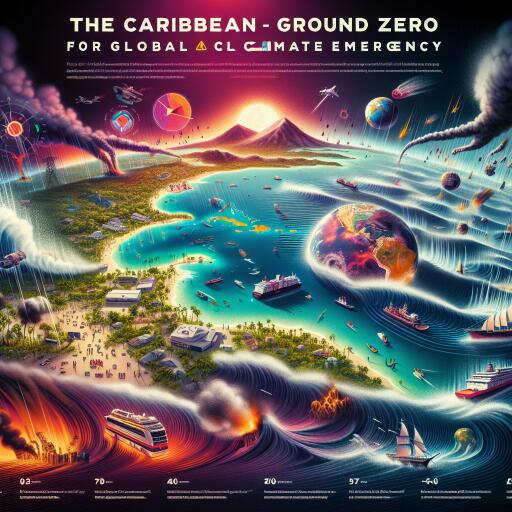
MIL-OSI United Nations: The Caribbean is ‘ground zero’ for the global climate emergency: Guterres
In an awe-inspiring vista, the stretched canvas of a rainforest with its tapestry of green, interwoven with bursts of orange and purple flowers, paints a picture of uncharted biodiversity and natural wonder. This scene, part of a UNESCO World Heritage Site, encapsulates around 11% of its nation’s land, boasting table-top mountains and a plethora of species yet to be discovered, largely untouched and unspoiled by human activities. The rivers – Coppename, Lucie, Saramacca, and Suriname – meander through this lush landscape, presenting a scenery so serene it resembles a meticulously crafted painting.
Yet, the journey towards this protected paradise reveals a haunting contrast. Before one reaches the sanctuary, the view unveils a grim reality where Suriname’s forests face severe threats from mining and timber industries, driven by economic incentives. The disruption is startlingly visible from above: swathes of deforestation and brownish patches marking the landscape, a testament to the rampant gold mining and the resultant flooding, laying bare the forest’s vulnerabilities.
Despite its geographical location in South America, Suriname shares a bond with the Caribbean through its history, culture, and similar ecological challenges, aligning itself with the plight and resilience of the small island nations in the region.
The significance of this connection was emphasized during the United Nations Secretary-General’s visit to the 43rd Caribbean Community and Common Market (CARICOM) Conference in Paramaribo. The event, enriched with diverse cultural performances, highlighted Suriname’s unique ethnic mosaic, a legacy of its historical narrative and colonial past. The Secretary-General, amidst this vibrant display, addressed the heads of state, underscoring the Caribbean’s leadership in climate action and its distinct biodiversity, particularly the importance of mangroves in coastal protection and carbon sequestration.
With the region at the forefront of the climate emergency, the UN Chief articulated the Caribbean’s acute vulnerability to the ongoing climate crisis, terming it “ground zero” for the global predicament. This urgency was painted against the backdrop of existing challenges such as the COVID-19 pandemic’s toll on health and economy, and the complicating global financial landscape, further strained by international conflicts.
The call for action was clear and compelling. The Secretary-General laid out a tripartite strategy focusing on scaling climate action to match the crisis’s urgency, reforming the global financial system to support sustainable development, and fostering resilience against future pandemics.
Firstly, the ambition to limit global warming to 1.5C is critical, demanding immediate and transformative actions in emissions reduction, adaptation support, and financial aid for resilience building. The leadership and conservation efforts by the Caribbean, including indigenous community initiatives, were acknowledged, yet a global escalation in ambition, particularly from the major emitters, is imperative.
Secondly, addressing the financial constraints faced by developing nations involves facilitating access to affordable financing, debt relief, and restructuring. The proposal for a Caribbean Resilience Fund and a reform of the international financial landscape suggests moving beyond traditional metrics like per capita income towards a ‘multidimensional vulnerability index’ that better reflects the intertwined challenges of debt and climate impacts.
Lastly, the persistence of the COVID-19 pandemic necessitates a coordinated global response to enhance local capacities in testing, vaccine, and treatment production, emphasizing the need for preparedness and response strategies for future global health crises.
In conclusion, the UN chief reaffirmed the United Nations’ commitment to supporting the Caribbean in navigating these challenges, advocating for a united global effort toward sustainable solutions and a resilient future for the region.





Leave a Reply